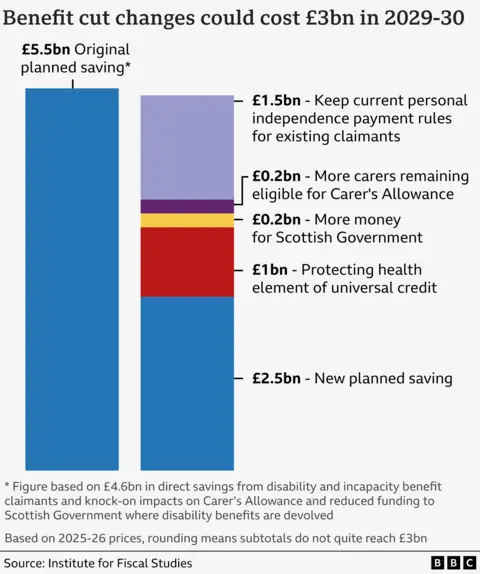 Getty Images
Getty ImagesThe government has made major concessions to Labour rebels over its planned changes to benefits, ahead of a vote on Tuesday.
People currently receiving personal independence payment (Pip), or the health element of universal credit (UC), will continue to do so.
However, the planned cuts will still affect future claimants.
What is Pip and how is it changing?
Pip is paid to 3.7 million people with a long-term physical or mental health condition in England and Wales.
It includes a daily living component and a mobility component. Claimants may be eligible for one or both.
The government plans to tighten daily living assessments for future claimants.
The assessments involve questions about everyday tasks, with each scored from zero – for no difficulty, to 12 – for most difficulty.
For example, needing help to wash your hair, or your body below the waist, would score two points, but needing help to wash between the shoulders and waist would be four points.
From November 2026, the government says people will need to score at least four points for one activity to qualify.
Existing claimants who request a reassessment after November 2026 – for example, because of worsening health – will be considered under the new rules.
The daily living payments are:
- a standard rate of £73.90 per week
- an enhanced rate of £110.40 per week
The mobility payments – which are not affected by the changes – are:
- a standard rate of £29.20 per week
- an enhanced rate of £77.05 per week
Pip is not linked to someone’s savings or income and does not affect other benefits, or the benefit cap. People can get Pip if they are working.
The government plans more frequent reassessments of Pip payments. However, it says those with the highest levels of a permanent condition or disability will no longer face reassessment.
How is universal credit changing?
The government also plans changes to universal credit (UC).
More than three million recipients have no requirement to find work due to their health, a number that has risen sharply.
The basic level of universal credit is £400.14 a month for a single person aged 25 or over.
But if someone has limited capacity to work because of a disability or long term condition, this payment more than doubles, because of an incapacity top-up worth £423.27.
Under the government’s proposals, claimants will no longer be eligible for this until they are aged 22 or over.
New claimants will also see this top-up fall from £97 per week in 2025-26 to £50 a week by 2026-27, before being frozen until the end of 2029-30.
The government had planned to freeze the higher rate for existing health-related claimants but this will now rise in line with inflation.
The basic payment level for universal credit will rise to £106 a week by 2029-30.
Who will be affected by the changes?
Critics have raised concerns that the proposals will treat people with the same conditions differently, depending on whether they are existing or new claimants.
The Department for Work and Pensions (DWP) says those who would have received Pip or the incapacity top-up in the future will lose out financially:
- 430,000 future Pip recipients will lose an average of £4,500 per year
- 730,000 future UC recipients will lose an average of £3,000 per year
An estimated 150,000 people may be pushed into relative poverty by 2030 as a result of the welfare cuts, according to modelling published by the DWP.
Before the government scaled back the proposals, the figure was 250,000 people.
However, the DWP says the estimate does not include any “potential positive impact” from extra funding, or measures to support people with disabilities and long-term health conditions back into work.
The DWP also said 3.8 million families will gain an average of £420 a year from the increase in the standard UC allowance and changes to the assessment process.
Changes to UC will apply across the UK.
The changes to Pip will apply in England, Wales and Northern Ireland.
In Scotland, Pip is being phased out and replaced with Adult Disability Payment.
However, although the new Pip rules won’t apply, any reduction on spending on the benefit by Westminster would have a knock-on effect on the Scottish government’s budget.
What is being done to get more people into work?
 Getty
GettySetting out the changes to its original welfare plans, Work and Pensions Secretary Liz Kendall said there would be an extra £300m investment into employment support for sick and disabled people.
She says this will take total investment up to £600m in 2026-2027, £800m in 2027-2028, and £1bn in 2028-29.
The government also wants to break the link between trying to get into work and losing benefits.
The work capability assessment, which checks eligibility for the health related top-up to universal credit, will be scrapped by 2028.
Instead, claimants will go through the Pip system to claim a health benefit. The government says they will be assessed on how their disability affects their daily life, rather than on their capacity to work.
A new “right to try” system will mean people will not be financially penalised if they take a job which doesn’t work out.
The government will also consult on merging employment and support allowance and jobseeker’s allowance into a single time-limited benefit that is not means-tested. This would be more generous but available for a shorter period.
Why does the government want to cut welfare spending?
In 2019, almost three million working-age adults (aged 16 to 64) in England and Wales claimed either disability or incapacity benefit. That is 1 in 13 of the population.
By March 2025, that had grown to about four million or 1 in 10, according to the Institute for Fiscal Studies think tank.
The rise has been fuelled by an increase in the number of claimants citing mental health conditions.
Even if the government had gone ahead with its initial reforms, the working-age welfare bill had been set to rise to about £72.3bn in 2029-30.
Before announcing its concessions, the government hoped to save £5.5bn a year by 2030.
However, following the concessions, that saving is now expected to be £2.5bn.




